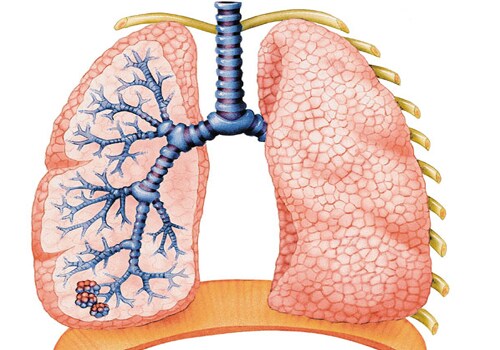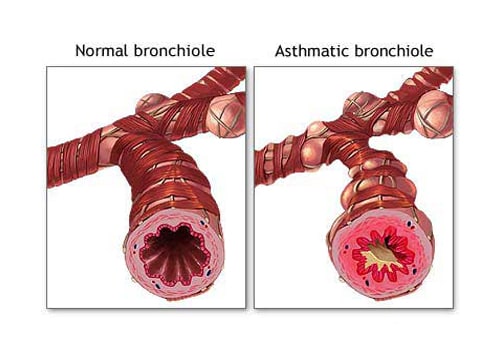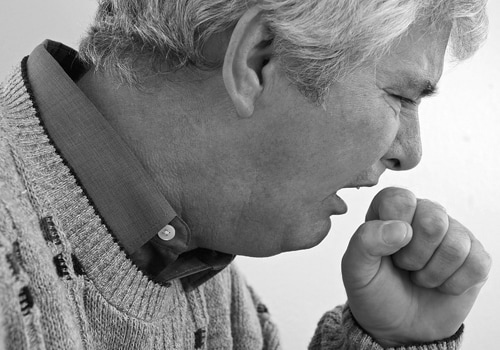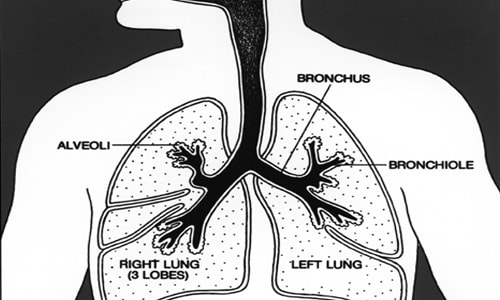-

What is asthma?
Asthma is a lung condition that causes wheezing, coughing, and shortness of breath. It is triggered by irritants or some allergen, like - cold air, viruses, tobacco smoke, dust, pollen, moulds, and animal dander. Some people have coughing or wheezing only during exercise (called exercise-induced asthma).
An asthma attack may last a few minutes or for days. Attacks can happen anywhere and at any time. It is very important to get treatment for asthma to live a healthy, active life. -

How does it occur?
In asthma, the lining of the airways in the lungs is swollen, even when there are no symptoms. When exposed to irritants or allergens, the airways become more swollen and begin to make excess mucus. The tiny muscles in the walls of the airways begin to contract. These reactions decrease the airway openings, making it harder for air to move in and out. The whistling sound of air moving through the narrowed air passages is called wheezing. The extra mucus in the airways causes coughing.
-

What are the symptoms?
The patient has difficulty in breathing, wheezing, coughing, shortness of breath and tightness in the chest.
-

How is it treated?
The aim of treatment is for asthmatics to have a normal, active life. The treatment will include medicines and the removal of any allergy-causing substances or irritants from the environment. Two types of medications are used to control asthma – fast acting medicines called bronchodilators and preventive medicines.
Bronchodilators relax the muscles in the airways. When the muscles are relaxed, the airways become larger and allow more space for air to move in and out. This medicine is taken by inhaling it - breathing it into the lungs while spraying it into the mouth. People prone to asthma, should always have a bronchodilator with them. Taking the inhaler before exercise can prevent exercise-induced asthma. Salbutamol is the generic name of the most widely used fast-acting bronchodilator delivered by an inhaler or a nebulizer.
The preventive medicines are now considered the best and safest way to control asthma. These medicines prevent asthma attacks and chronic asthma symptoms, such as shortness of breath, allowing people with asthma to live active lives, including participation in sports. The common preventive medicines are a long-acting bronchodilator called salmeterol and inhaled steroids, such as betamethasone.
Additional types of preventive medicines include theophylline, a pill often taken at bedtime to prevent wheezing at night and chromoglycate which is inhaled three to four times a day. In addition to using a quick-acting bronchodilator during an asthma attack, different types of preventive medicines may be combined for the best control of wheezing.
For the right treatment, the asthmatics need to work closely with their doctor. The inhaler should be used correctly by reading the directions that come with it. Most inhalers work best when held 1 to 2 inches in front of the mouth during use. If the mouth is closed around the inhaler, less amount of the medicine will reach the lungs. A spacer tube or spacehaler can be used for better delivery of the medicine to the lungs. One end of the spacer is attached to the inhaler and the other end is put in the mouth. This allows the asthmatic to breathe in slowly and fully and to inhale more of the asthma medicine. This is especially useful in asthmatic children who can have a problem in coordinating the inhaler with their breathing. -

What care should be taken at home?
These guidelines may help to keep asthma under control:
- Avoid smoke, especially cigarette smoke, vapours and chemical fumes.
- Stay indoors during the humid season or the change of seasons especially when the pollen count is high.
- Do not use fans in closed and dusty places.
- Cover mattresses and pillows with plastic covers. Wash the bedding in hot water every week.
- Do not use a vaporizer or humidifier unless it is thoroughly cleaned.
- Do not have close contact with pets. Pet owners should bathe their pet weekly.
- The cleaning of the house or the surroundings should be done by wet mopping rather than sweeping, wherever possible. This avoids the generation of allergen aerosols which could act as a triggering factor.
- The doctor should be contacted in case the medicines are not effective in keeping the breathing comfortable.
-

How long will the effects of asthma last?
Asthma is a chronic condition, even though there might not be any symptoms for decades. Asthma is more common in children than in adults. People who had asthma as children often have no symptoms once they become adults, but the symptoms may come back later in life. Asthma that develops for the first time in mid or late life usually continues to be a problem later on in life. But, with proper treatment, the affected person can lead a healthy and active life.


















